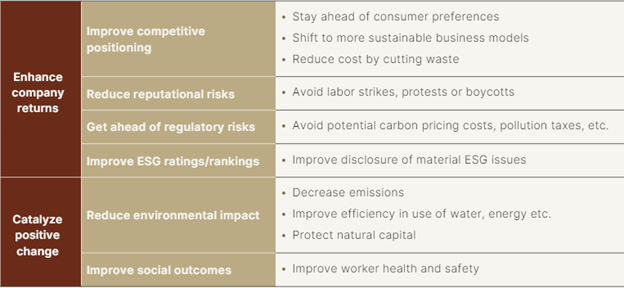The energy transition presents investors and those climate-aligned with a variety of opportunities to capitalize on and drive decarbonization efforts. Ocean sustainability remains a fairly overlooked category for investors despite the outsized role the world’s oceans play both economically and for species survival. One fund sets out to capture the sustainability and return potential through engagement in the blue economy.
There exist only a handful of funds focused specifically on the energy transition or sustainability as it relates to oceans. The KraneShares Rockefeller Ocean Engagement ETF (KSEA) is one that seeks to improve the health of the seventh-largest economy globally, according to a recent report from Rockefeller Asset Management. The ocean economy is worth an estimated $3 trillion annually, absorbs 90% of global warming heat, and retains 25% of global carbon dioxide emissions.
“Investing in the blue economy is essential in combating economic, climate, and biodiversity risks that trouble us today,” Rockefeller Asset Management wrote. “The potential investment opportunity is immense.”
KSEA Drives Change, Benefits Investors Through Engagement
KSEA seeks to invest in companies that have significant impacts on oceans and ocean resources, known as the “blue economy.” Investing in these companies allows Rockefeller Asset Management, the fund’s subadvisor, to deploy its engagement practices.
Rockefeller Asset Management brings more than 30 years of ESG investing experience to the table. Additionally, the firm holds more than a decade of experience investing in the ocean economic system, and partners with The Ocean Foundation.
“We look for opportunities to actively engage with companies to address material issues that can enhance their risk profile and seek to exploit opportunities linked to the sustainable development goals (SDG),” Rockefeller Asset Management wrote.
Active engagement with companies provides the dual benefit of risk reduction and increased sustainability. In particular, the firm seeks out companies that have substantial room for improvements in these arenas. Rockefeller Asset Management believes that “incorporating engagement into the investment process can lead to share price outperformance over the long term.”

Image source: Rockefeller Asset Management
The team uses a four-step process of escalating shareholder engagement. Once an engagement plan is agreed upon, and a company’s management is found to be cooperative and receptive to change, the team follows its engagement protocol. This includes having constructive dialogue, official letters, collaborative action, and shareholder resolutions.
“We seek to proactively engage with management, often speaking to individual companies several times a year,” they explained. “Our four-step engagement process enables us to enhance company returns and catalyze positive change.”
Invest in the Return Potential of Improved Sustainability
KSEA invests across commercial fishing, waste management, aquaculture, renewable energy, and other industries. The strategy focuses primarily on companies dubbed “ocean improvers.” These companies offer the most significant potential positive impacts for sustainability via engagement. The fund also invests in companies categorized as “ocean leaders” and “ocean solutions.”
The strategy avoids companies that endanger ocean health, such as deep sea mining companies or offshore oil.
Top holdings for KSEA include Waste Management Inc, Advanced Drainage, and Trimble Inc as of 02/21/24. Since launch in September 2023, the fund is up 3.91% on a price return basis and 4.05% on a total return basis.
KSEA has a management fee of 0.86%.
For more news, information, and analysis, visit the Climate Insights Channel.

